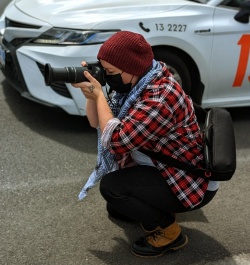News & Media > Editorials > RSPCA Tasmania, Jan Davis, and the direction of the society
RSPCA Tasmania, Jan Davis, and the direction of the society
On July 19 1878, a group of ''concerned citizens'' formed the first animal protection society in Tasmania, as response to the introduction of the Prevention of Cruelty Animals Act of 1877.
Whilst animal welfare laws of a sort have existed in Tasmania since 1837, no single organisation or government body had taken responsibility for the prosecution of cruelty cases until the establishment of the Society for the Prevention of Cruelty to Animals.
Their efficacy in prosecuting cases was limited by a lack of resources, and so to better advocate for animal welfare the SPCA engaged in public educational outreach and the targeting of individuals responsible for animal cruelty, whilst also developing a working relationship with local government and police. In one notable case in 1883, the SPCA were able to effect the prosecution of one Bridget Coffee for the death of a pig ''due to brutal usage'', resulting in a one month imprisonment.
As an organisation they engaged in the routine inspection of Hobart’s quarries, coal pits and slaughter-yards, effecting welfare changes on behalf of the horses, mules, sheep and oxen used there.
In 1925 the SPCA of Tasmania were actively involved in campaigning against the establishment of an open hunting season of game species for flesh and fur, stating it would ''deal a deathblow to the fauna of Tasmania.’’
In 1956 the Royal Warrant was granted to the SPCA, and in 1980 RSPCA Tasmania helped form the national RSPCA Australia body.
Over the past two decades, RSPCA Tasmania has been increasingly beset by criticisms, internal conflict, and political machinations. The lowered intake and increased euthanasia rates of 2008-2010 led to Jan Cameron's withdrawal of millions in pledged funding. Multiple members who were critical of operations and the usage of funding have been banned from involvement with the organisation on all levels. And in 2012 the then CEO was sacked amid allegations of bullying and threats against staff.
In 2018 RSPCA Tasmania closed their Hobart and Launceston shelters, with responsibility for dog and cat surrenders taken over by The Dogs' Homes of Tasmania and Just Cats Tasmania, as well as multiple independent rescue organisations. The inspectorate is restricted in its ability to investigate cases of animal cruelty involving commercial livestock and wildlife, after the organisation entered into a Memorandum of Understanding with the State government and DPIPWE, and comprises of six inspectors for the entire state.
And now, the organisation is moving into a new phase, with the appointment of Jan Davis as the CEO; and based on her history this phase may prove as problematic (if not more so) than the decades preceding.

Davis is the former CEO of the Tasmanian Farmers and Graziers Association, and has enjoyed a lengthy career as an agribusiness lobbyist. Her attitudes towards non-human animals (and those who advocate for them) have been well documented in the media over the years. She has previously expressed support for the live export industry, for the use of 1080 poison, and for the slaughter of native wildlife for flesh and fur (remember the SPCA campaign of 1925?), even going so far as to describe wallabies as “pests’’. Davis has shown herself to be staunchly anti-activist, and has said she will be using her experiences in animal agriculture to inform her leadership of the organisation.
From its establishment in 1878, RSPCA Tasmania has never been against the usage of animals. Even when prosecuting cases of cruelty to those horses used in the quarries and slaughter-yards of 1880s Hobart, the continued usage of those animals was never questioned. But over the years the scope of the RSPCA's ability to investigate and advocate has at least extended to include the welfare of non-human animals labelled livestock.
Now, with the Memorandum of Understanding in place, that scope is largely limited to animals considered companions only. And even then, with the closure of the shelters and the burden of rehabilitation and rehoming placed on other organisations, that scope itself has been severely restricted.
And with a new CEO who views non-human animals as commodities, indeed supporting aspects of the animal agricultural industry that do not enjoy widespread community support (live export and the use of 1080), it has become apparent that RSPCA Tasmania has strayed far from its roots even as a welfarist organisation, hampered by internal conflict and the deliberate undermining of its own investigative authority in pursuit of political gains.
Set within the context of RSPCA Australia's own accreditation program promoting the consumption of products taken from the bodies of non-human animals, well may we question their continued use of the motto '’for all creatures great and small.’’
References
https://press-files.anu.edu.au/downloads/press/p200721/html/ch04.html?referer&page=9
https://www.examiner.com.au/story/6728986/rspca-tasmania-appoints-jan-davis-as-new-ceo/
https://www.theadvocate.com.au/story/6730594/animals-and-advocacy-a-marriage-made-in-heaven/
http://theveterinarian.com.au/?p=1748
https://www.theadvocate.com.au/story/5502061/live-exports-reveal-multiple-failures/
https://www.themercury.com.au/news/tasmania/with-a-population-explosion-under-way-is-wallaby-meat-tasmanias-most-wasted-resource/news-story/e369258ebbb221f27fa6d2dbfe9d0136
https://www.themercury.com.au/news/opinion/talking-point-protest-without-breaking-the-law/news-story/3420ccb1123a7d97b6d42a3788fd03d9
https://www.themercury.com.au/news/opinion/well-stop-protests-and-raids-when-farms-open-their-gates-to-the-truth/news-story/4ef009e979e32be36bd5c215e3c664d5



